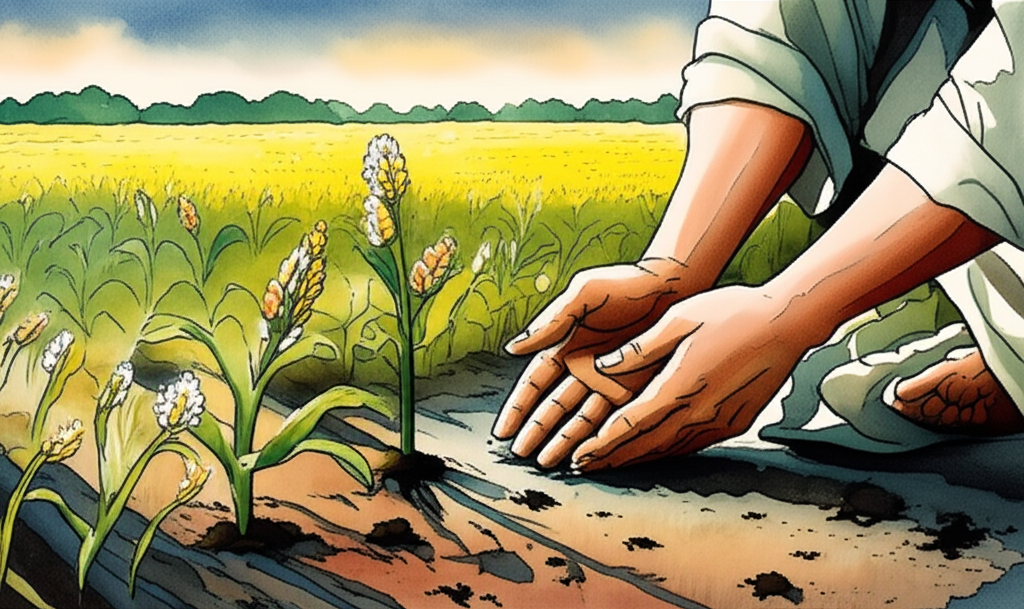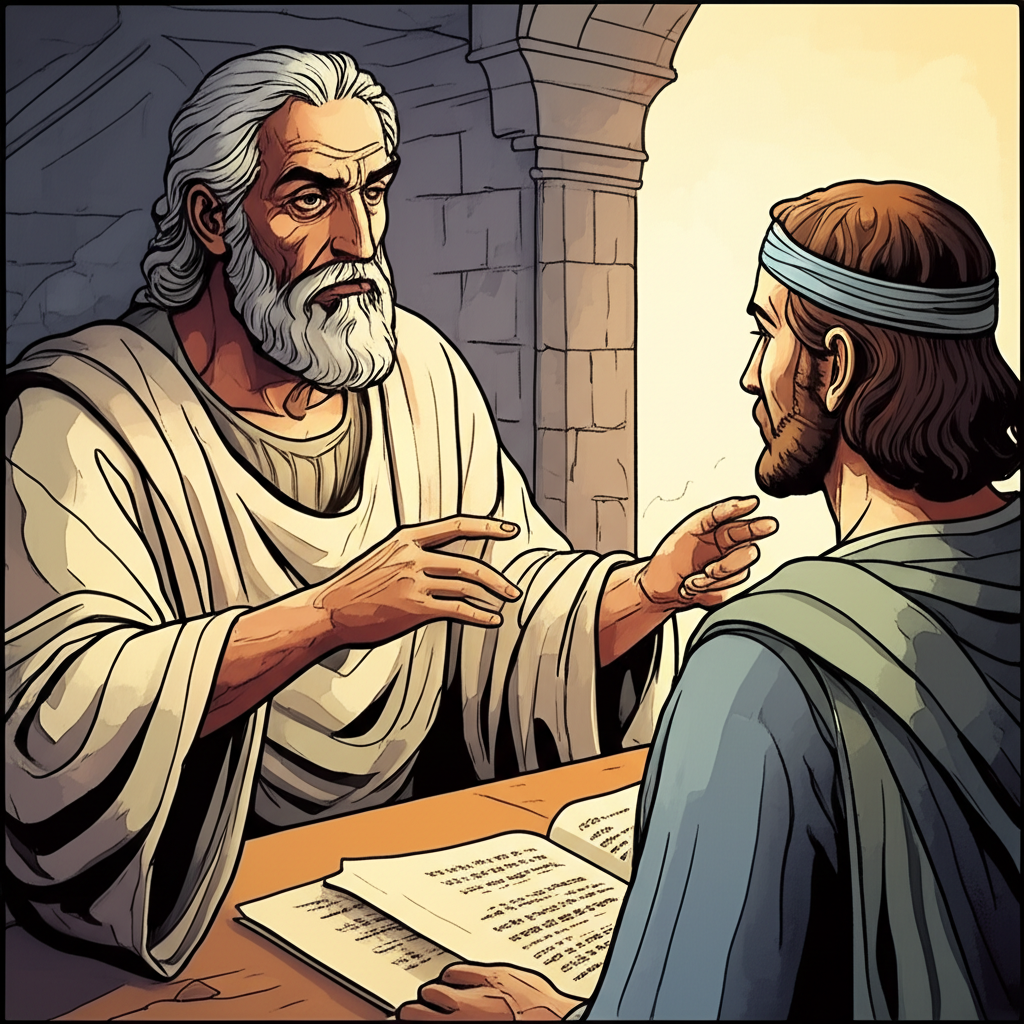Job 5 meaning explained in AI Summary
Job Chapter 5 continues with Eliphaz, Job's friend, offering his perspective on Job's suffering. He doesn't directly accuse Job of sinning like in his previous speech, but instead focuses on the nature of God and suffering.
1. The Futility of Anger (vs. 1-7): Eliphaz begins by questioning the usefulness of Job's anger and bitterness. He argues that no one is truly righteous and that suffering is a natural part of life, even for the innocent. He uses vivid imagery of a fleeting wind and a hungry bird to illustrate the pointlessness of fighting against God's will.
2. The Greatness and Justice of God (vs. 8-16): Eliphaz then shifts his focus to God's power and sovereignty. He describes God as the ultimate judge and protector, capable of both giving and taking away. He emphasizes that God is just and will not allow the wicked to prosper forever, while the righteous will ultimately be rewarded.
3. The Hope of God's Discipline (vs. 17-27): Eliphaz suggests that Job's suffering might be a form of divine discipline, meant to refine and strengthen him. He assures Job that if he repents and turns back to God, he will experience restoration and blessing. He paints a picture of a future filled with peace, prosperity, and security for those who trust in God.
Key Themes:
- God's Sovereignty: Eliphaz emphasizes God's absolute power and control over all things, including suffering.
- Human Fragility: He highlights the limitations and weaknesses of humanity compared to God's greatness.
- The Mystery of Suffering: While not offering a direct answer, Eliphaz acknowledges the perplexing nature of suffering, even for the righteous.
- Hope in God's Mercy: Despite the pain, Eliphaz encourages Job to find hope in God's mercy and the possibility of restoration.
Overall Message:
Eliphaz's speech, while well-intentioned, reflects a limited understanding of Job's situation. He presents a simplistic view of suffering as a direct consequence of sin, failing to grasp the complexity of God's plan. Nevertheless, his words contain elements of truth about God's character and the potential for hope amidst suffering.
Job 5 bible study ai commentary
In his first speech, Eliphaz continues to apply his rigid theological framework to Job's suffering. He argues that human affliction is not random but is the direct consequence of foolishness and sin. Shifting from a general principle in chapter 4 to a specific application, Eliphaz urges Job to stop complaining, which he sees as futile and self-destructive. He then contrasts Job's supposed foolishness with the proper response: seeking God. Eliphaz paints a grand picture of God's power to thwart the wicked and save the humble, promising that if Job accepts his suffering as righteous discipline and repents, God will heal him and restore his prosperity, granting him a long and secure life.
Job 5 Context
Eliphaz's speech is a prime example of Ancient Near Eastern (ANE) "Wisdom literature." His argument is built on a standard ANE belief in a mechanistic "retribution theology"—that is, the gods (or in this case, God) operate by a strict and predictable system of reward and punishment. Good deeds result in prosperity; bad deeds result in suffering. This speech directly reflects the common-sense, observational wisdom found in parts of the book of Proverbs. The cultural setting assumed that friends and elders had a duty to confront and correct someone who was clearly under divine judgment. Eliphaz is not acting purely out of malice but out of a deeply ingrained, though tragically misapplied, worldview.
Job 5:1
"Call now; is there anyone who will answer you? To which of the holy ones will you turn?"
In-depth-analysis
- Rhetorical Challenge: Eliphaz begins with a sarcastic dare. He dismisses Job's cries of innocence (from chapter 3) as pointless.
- "Holy Ones" (
qadoshim): This term refers to angels or members of the divine council (cf. Job 1:6). Eliphaz asserts that no heavenly being will act as an advocate for someone so obviously in the wrong. He isolates Job from both divine and human aid. - Theological Presumption: Eliphaz presumes to know how the heavenly court operates and declares Job has no standing. This contrasts with the prologue, where Satan, not Job's sin, is the accuser in that very council.
Bible references
- Psalm 89:7: "...a God greatly to be feared in the council of the holy ones..." (Context of the divine council).
- Zechariah 14:5: "...then the Lord my God will come, and all the holy ones with him." (Eschatological role of holy ones).
Cross references
Dan 4:17 (decree of the holy ones); Deut 33:2 (God with holy ones); Job 15:15 (God's distrust in holy ones).
Job 5:2-5
“For vexation kills the foolish man, and jealousy slays the simple. I have seen a foolish man taking root, but suddenly I cursed his dwelling. His children are far from safety; they are crushed in the gate, and there is no one to deliver them. The hungry eat his harvest, and he takes it even out of thorns, and the thirsty pant for his wealth.”
In-depth-analysis
- Direct Accusation: Eliphaz diagnoses Job's emotional state ("vexation,"
ka'as; "jealousy,"qin'ah) as the self-destructive hallmark of a "foolish man" (ewil). He implies Job's passionate lament is not righteous grief but sinful resentment. - Personal Testimony: "I have seen..." Eliphaz presents an anecdotal parable as empirical evidence for his theological claim. This story cruelly mirrors Job's specific losses:
- "Cursed his dwelling": Job's home was destroyed.
- "His children are far from safety... crushed in the gate": Job's children were killed. The "gate" was the place of legal judgment; this means they had no legal recourse or defense.
- "The hungry eat his harvest": Marauders stole Job's livestock and wealth.
- Word-Level: The word "foolish" (
ewil) in wisdom literature isn't about intellect but moral and spiritual corruption. It describes one who scorns wisdom and discipline.
Bible references
- Psalm 37:35-36: "I have seen a wicked, ruthless man, spreading himself like a green laurel tree. But he passed away, and behold, he was no more..." (The transient success of the wicked).
- Proverbs 14:30: "A tranquil heart gives life to the flesh, but envy makes the bones rot." (Connection between inner sin and physical decay).
Cross references
Psa 73:3 (envy of the wicked); Psa 73:18-19 (sudden destruction); Prov 1:32 (complacency of fools destroys them); Job 1:13-19 (the events Eliphaz's story mirrors).
Job 5:6-7
“For affliction does not come from the dust, nor does trouble sprout from the ground, but man is born to trouble as the sparks fly upward.”
In-depth-analysis
- Theological Premise: Trouble is not random or natural ("from the dust"). It has a cause. Eliphaz denies chance.
- Universal Principle: "Man is born to trouble." Eliphaz presents suffering as a universal law, an inevitable consequence of humanity's fallen state.
- "Sparks" (
bənê-resep): Literally "sons of Resheph." Resheph was a Canaanite and Syrian deity of plague, pestilence, and fire. Eliphaz's statement could be a polemic, asserting that even phenomena attributed to pagan gods (like sparks or lightning bolts) are part of God's created order and subject to His laws. The upward flight of sparks is as natural and certain as man experiencing trouble. - The Flaw: While it's true humanity lives in a fallen world (
Gen 3), Eliphaz uses this general truth as a weapon to prove a specific, personal fault in Job. He assumes all trouble is punitive.
Bible references
- Genesis 3:17-19: "...cursed is the ground because of you; in pain you shall eat of it all the days of your life..." (The origin of trouble in the world).
- Romans 5:12: "...sin came into the world through one man, and death through sin, and so death spread to all men..." (Universal condition of sin and death).
Cross references
Ecc 2:23 (days of sorrow and vexation); Psa 90:7-9 (human frailty under God's wrath); Rom 8:20-22 (creation subject to futility).
Polemics
The reference to "sons of Resheph" subverts ANE mythology. Instead of Resheph being a malevolent force causing suffering, Eliphaz frames the effects associated with him ("sparks," affliction) as a predictable, almost "natural" law under the one true God's governance. He domesticates the chaotic pagan forces into his tidy theological system.
Job 5:8-16
“As for me, I would seek God, and to God would I commit my cause, who does great things and unsearchable, marvelous things without number... he gives rain on the earth and sends waters on the fields... He frustrates the devices of the crafty... He catches the wise in their own craftiness... But he saves the needy from the sword of their mouth and from the hand of the mighty. So the poor have hope, and injustice shuts her mouth.”
In-depth-analysis
- Model Response: "As for me..." Eliphaz presents his own pious path as the model for Job to follow: appeal directly to God.
- Hymn of Praise: Verses 9-16 read like a hymn praising God's omnipotence and justice. He highlights God's benevolent power (giving rain, v.10), his reversal of fortunes (lifting up the lowly, v.11), and his thwarting of the arrogant and "wise" (vv. 12-13).
- Theological Trap: While these statements about God are true, they are deployed to corner Job. Eliphaz implies that Job is among the "crafty" and "wise" (v. 13) whose schemes have been thwarted and who now needs to become one of the "lowly" and "needy" (vv. 11, 15) to be saved.
- NT Quotation: Paul quotes verse 13 in
1 Corinthians 3:19. However, Paul uses it to contrast human "wisdom" with God's wisdom in the cross. Eliphaz uses it to condemn a righteous man, assuming his suffering makes him one of the "crafty."
Bible references
- 1 Corinthians 3:19: "For the wisdom of this world is folly with God. For it is written, 'He catches the wise in their own craftiness.'" (NT use of v.13).
- Psalm 146:5-9: "Blessed is he whose help is the God of Jacob... who executes justice for the oppressed, who gives food to the hungry." (Parallels the description of God as helper of the poor).
- Luke 1:51-53: "...he has brought down the mighty from their thrones and exalted those of humble estate; he has filled the hungry with good things..." (Mary's Magnificat echoes this theme of reversal).
Cross references
Psa 40:5 (God's wonderful deeds); Psa 72:12-14 (king delivering the needy); Psa 107:41-42 (hope for the needy); Job 9:10 (Job quotes v.9 back).
Job 5:17
“Behold, blessed is the man whom God reproves; therefore despise not the discipline of the Almighty.”
In-depth-analysis
- Central Thesis: This is the core of Eliphaz's advice. Suffering is equated with divine discipline (
musar). - "Blessed" (
ashrei): The verse starts with a beatitude. Eliphaz presents suffering not as a tragedy, but as a blessing in disguise, a sign that God has taken a personal interest in correcting you. - The Almighty (
Shaddai): Eliphaz uses this patriarchal name for God, emphasizing overwhelming power. Resistance to such a God's discipline is both foolish and futile. - A Partial Truth: The idea that God disciplines those He loves is a profound biblical truth. The error lies in Eliphaz's absolute and unyielding application of it as the only explanation for suffering.
Bible references
- Proverbs 3:11-12: "My son, do not despise the Lord's discipline or be weary of his reproof, for the Lord reproves him whom he loves, as a father the son in whom he delights." (The clearest parallel in Proverbs).
- Hebrews 12:5-6: "...'My son, do not regard lightly the discipline of the Lord... For the Lord disciplines the one he loves.'" (Quotes Prov. 3:11-12 to encourage suffering Christians, putting the concept in its proper redemptive-historical context).
- Revelation 3:19: "Those whom I love, I reprove and discipline, so be zealous and repent." (Christ's words to the Laodicean church).
Cross references
Psa 94:12 (blessed is the man you discipline); Deut 8:5 (God disciplines like a father); Jam 1:12 (blessed is the man who remains steadfast under trial).
Job 5:18-27
“For he wounds, but he binds up; he shatters, but his hands heal. He will deliver you from six troubles; in seven no evil shall touch you... you shall be in league with the stones of the field, and the beasts of the field shall be at peace with you... You shall come to your grave in ripe old age, like a sheaf of grain... Behold, this we have searched out; it is true. Hear, and know it for yourself.”
In-depth-analysis
- Wound and Heal (v.18): Eliphaz presents a balanced picture of God's actions—He is sovereign over both the affliction and the restoration. This powerful aphorism highlights God's ultimate healing power.
- Numerical Proverb (v.19): "Six... seven" is a poetic device indicating completeness and totality. Eliphaz promises absolute protection from all conceivable disasters if Job repents. The irony is devastating, as Job has experienced many of these troubles (famine from loss of livestock, sword from marauders).
- Promise of Cosmic Peace (v.23): "In league with the stones... beasts... at peace." This describes a reversal of the curse of Genesis 3, a restored Edenic harmony with nature itself.
- Promises of Restoration (vv.24-26): Eliphaz promises Job everything he has just lost: a secure home (
ohel, tent), flourishing posterity, and a long life ending in a natural, timely death. Each promise is a sharp, painful contrast to Job's present reality. - Arrogant Conclusion (v.27): "This we have searched out; it is true." Eliphaz and his friends present their traditional wisdom not as advice, but as established, empirically verified fact. He demands Job's assent ("know it for yourself"), closing the door on any other possible explanation for his suffering.
Bible references
- Deuteronomy 32:39: "See now that I, even I, am he, and there is no god beside me; I kill and I make alive; I wound and I heal..." (God's absolute sovereignty over life, death, pain, and healing).
- Hosea 6:1: "Come, let us return to the Lord; for he has torn us, but he will heal us; he has struck us down, and he will bind us up." (The proper repentant response that Eliphaz desires from Job).
- Psalm 91:10-13: "...no evil shall be allowed to befall you... You will tread on the lion and the adder..." (A psalm of protection that promises similar security).
Cross references
Hos 2:18 (covenant with beasts); Isa 11:6-9 (eschatological peace with nature); Prov 30:18-19 (numerical sayings); Gen 15:15 (promise of dying at a good old age).
Job chapter 5 analysis
- The Problem of Partial Truth: Eliphaz’s speech is compelling because it is filled with statements that, in isolation, are true. God is powerful; God can be sought; God does discipline His people; repentance can lead to restoration. The fatal flaw is not in the individual statements but in the rigid, heartless application of them as a simple formula
(suffering = sin), which misdiagnoses Job’s unique situation and denies the possibility of innocent, testing-related suffering. - Retribution Theology vs. Reality: This chapter is a textbook presentation of a tidy, cause-and-effect theology that cannot account for the book of Job's central problem. Eliphaz’s god is predictable and can be managed by following the rules. The God who speaks from the whirlwind is sovereign, wild, and His reasons are beyond human calculation.
- Irony and Cruelty: Eliphaz’s counsel is deeply ironic. He describes Job's exact losses (children, wealth, home) as the fate of the "foolish" (v. 3-5) and then promises their exact restoration as the reward for repentance (v. 24-26). This turns the knife rather than providing comfort.
- Precursor to the Law and the Gospel: Eliphaz’s system operates like a precursor to the curse of the Law (Deuteronomy 28). If you obey, you get blessings; if you disobey, you get curses. It lacks the concept of grace and a mediator. Job’s real need is not a formula for success, but a redeemer (
go'el) as he later cries out for in Job 19:25. Eliphaz offers a transactional relationship with God, while the Bible ultimately reveals a covenantal one based on grace.
Job 5 summary
Eliphaz concludes his first speech by intensifying his argument: he portrays suffering as God's infallible judgment on sin and foolishness. After illustrating the swift ruin of the wicked with a parable that cruelly mirrors Job's tragedy, he presents the "correct" path. He exhorts Job to seek God, praising His immense power to save the lowly and humble. The central message is that Job’s affliction is a blessed form of divine discipline; if he accepts it and repents, God will heal him and restore his life, wealth, and family with absolute security.
Job 5 AI Image Audio and Video










Job chapter 5 kjv
- 1 Call now, if there be any that will answer thee; and to which of the saints wilt thou turn?
- 2 For wrath killeth the foolish man, and envy slayeth the silly one.
- 3 I have seen the foolish taking root: but suddenly I cursed his habitation.
- 4 His children are far from safety, and they are crushed in the gate, neither is there any to deliver them.
- 5 Whose harvest the hungry eateth up, and taketh it even out of the thorns, and the robber swalloweth up their substance.
- 6 Although affliction cometh not forth of the dust, neither doth trouble spring out of the ground;
- 7 Yet man is born unto trouble, as the sparks fly upward.
- 8 I would seek unto God, and unto God would I commit my cause:
- 9 Which doeth great things and unsearchable; marvellous things without number:
- 10 Who giveth rain upon the earth, and sendeth waters upon the fields:
- 11 To set up on high those that be low; that those which mourn may be exalted to safety.
- 12 He disappointeth the devices of the crafty, so that their hands cannot perform their enterprise.
- 13 He taketh the wise in their own craftiness: and the counsel of the froward is carried headlong.
- 14 They meet with darkness in the day time, and grope in the noonday as in the night.
- 15 But he saveth the poor from the sword, from their mouth, and from the hand of the mighty.
- 16 So the poor hath hope, and iniquity stoppeth her mouth.
- 17 Behold, happy is the man whom God correcteth: therefore despise not thou the chastening of the Almighty:
- 18 For he maketh sore, and bindeth up: he woundeth, and his hands make whole.
- 19 He shall deliver thee in six troubles: yea, in seven there shall no evil touch thee.
- 20 In famine he shall redeem thee from death: and in war from the power of the sword.
- 21 Thou shalt be hid from the scourge of the tongue: neither shalt thou be afraid of destruction when it cometh.
- 22 At destruction and famine thou shalt laugh: neither shalt thou be afraid of the beasts of the earth.
- 23 For thou shalt be in league with the stones of the field: and the beasts of the field shall be at peace with thee.
- 24 And thou shalt know that thy tabernacle shall be in peace; and thou shalt visit thy habitation, and shalt not sin.
- 25 Thou shalt know also that thy seed shall be great, and thine offspring as the grass of the earth.
- 26 Thou shalt come to thy grave in a full age, like as a shock of corn cometh in in his season.
- 27 Lo this, we have searched it, so it is; hear it, and know thou it for thy good.
Job chapter 5 nkjv
- 1 "Call out now; Is there anyone who will answer you? And to which of the holy ones will you turn?
- 2 For wrath kills a foolish man, And envy slays a simple one.
- 3 I have seen the foolish taking root, But suddenly I cursed his dwelling place.
- 4 His sons are far from safety, They are crushed in the gate, And there is no deliverer.
- 5 Because the hungry eat up his harvest, Taking it even from the thorns, And a snare snatches their substance.
- 6 For affliction does not come from the dust, Nor does trouble spring from the ground;
- 7 Yet man is born to trouble, As the sparks fly upward.
- 8 "But as for me, I would seek God, And to God I would commit my cause?
- 9 Who does great things, and unsearchable, Marvelous things without number.
- 10 He gives rain on the earth, And sends waters on the fields.
- 11 He sets on high those who are lowly, And those who mourn are lifted to safety.
- 12 He frustrates the devices of the crafty, So that their hands cannot carry out their plans.
- 13 He catches the wise in their own craftiness, And the counsel of the cunning comes quickly upon them.
- 14 They meet with darkness in the daytime, And grope at noontime as in the night.
- 15 But He saves the needy from the sword, From the mouth of the mighty, And from their hand.
- 16 So the poor have hope, And injustice shuts her mouth.
- 17 "Behold, happy is the man whom God corrects; Therefore do not despise the chastening of the Almighty.
- 18 For He bruises, but He binds up; He wounds, but His hands make whole.
- 19 He shall deliver you in six troubles, Yes, in seven no evil shall touch you.
- 20 In famine He shall redeem you from death, And in war from the power of the sword.
- 21 You shall be hidden from the scourge of the tongue, And you shall not be afraid of destruction when it comes.
- 22 You shall laugh at destruction and famine, And you shall not be afraid of the beasts of the earth.
- 23 For you shall have a covenant with the stones of the field, And the beasts of the field shall be at peace with you.
- 24 You shall know that your tent is in peace; You shall visit your dwelling and find nothing amiss.
- 25 You shall also know that your descendants shall be many, And your offspring like the grass of the earth.
- 26 You shall come to the grave at a full age, As a sheaf of grain ripens in its season.
- 27 Behold, this we have searched out; It is true. Hear it, and know for yourself."
Job chapter 5 niv
- 1 "Call if you will, but who will answer you? To which of the holy ones will you turn?
- 2 Resentment kills a fool, and envy slays the simple.
- 3 I myself have seen a fool taking root, but suddenly his house was cursed.
- 4 His children are far from safety, crushed in court without a defender.
- 5 The hungry consume his harvest, taking it even from among thorns, and the thirsty pant after his wealth.
- 6 For hardship does not spring from the soil, nor does trouble sprout from the ground.
- 7 Yet man is born to trouble as surely as sparks fly upward.
- 8 "But if I were you, I would appeal to God; I would lay my cause before him.
- 9 He performs wonders that cannot be fathomed, miracles that cannot be counted.
- 10 He provides rain for the earth; he sends water on the countryside.
- 11 The lowly he sets on high, and those who mourn are lifted to safety.
- 12 He thwarts the plans of the crafty, so that their hands achieve no success.
- 13 He catches the wise in their craftiness, and the schemes of the wily are swept away.
- 14 Darkness comes upon them in the daytime; at noon they grope as in the night.
- 15 He saves the needy from the sword in their mouth; he saves them from the clutches of the powerful.
- 16 So the poor have hope, and injustice shuts its mouth.
- 17 "Blessed is the one whom God corrects; so do not despise the discipline of the Almighty.
- 18 For he wounds, but he also binds up; he injures, but his hands also heal.
- 19 From six calamities he will rescue you; in seven no harm will touch you.
- 20 In famine he will deliver you from death, and in battle from the stroke of the sword.
- 21 You will be protected from the lash of the tongue, and need not fear when destruction comes.
- 22 You will laugh at destruction and famine, and need not fear the wild animals.
- 23 For you will have a covenant with the stones of the field, and the wild animals will be at peace with you.
- 24 You will know that your tent is secure; you will take stock of your property and find nothing missing.
- 25 You will know that your children will be many, and your descendants like the grass of the earth.
- 26 You will come to the grave in full vigor, like sheaves gathered in season.
- 27 "We have examined this, and it is true. So hear it and apply it to yourself."
Job chapter 5 esv
- 1 "Call now; is there anyone who will answer you? To which of the holy ones will you turn?
- 2 Surely vexation kills the fool, and jealousy slays the simple.
- 3 I have seen the fool taking root, but suddenly I cursed his dwelling.
- 4 His children are far from safety; they are crushed in the gate, and there is no one to deliver them.
- 5 The hungry eat his harvest, and he takes it even out of thorns, and the thirsty pant after his wealth.
- 6 For affliction does not come from the dust, nor does trouble sprout from the ground,
- 7 but man is born to trouble as the sparks fly upward.
- 8 "As for me, I would seek God, and to God would I commit my cause,
- 9 who does great things and unsearchable, marvelous things without number:
- 10 he gives rain on the earth and sends waters on the fields;
- 11 he sets on high those who are lowly, and those who mourn are lifted to safety.
- 12 He frustrates the devices of the crafty, so that their hands achieve no success.
- 13 He catches the wise in their own craftiness, and the schemes of the wily are brought to a quick end.
- 14 They meet with darkness in the daytime and grope at noonday as in the night.
- 15 But he saves the needy from the sword of their mouth and from the hand of the mighty.
- 16 So the poor have hope, and injustice shuts her mouth.
- 17 "Behold, blessed is the one whom God reproves; therefore despise not the discipline of the Almighty.
- 18 For he wounds, but he binds up; he shatters, but his hands heal.
- 19 He will deliver you from six troubles; in seven no evil shall touch you.
- 20 In famine he will redeem you from death, and in war from the power of the sword.
- 21 You shall be hidden from the lash of the tongue, and shall not fear destruction when it comes.
- 22 At destruction and famine you shall laugh, and shall not fear the beasts of the earth.
- 23 For you shall be in league with the stones of the field, and the beasts of the field shall be at peace with you.
- 24 You shall know that your tent is at peace, and you shall inspect your fold and miss nothing.
- 25 You shall know also that your offspring shall be many, and your descendants as the grass of the earth.
- 26 You shall come to your grave in ripe old age, like a sheaf gathered up in its season.
- 27 Behold, this we have searched out; it is true. Hear, and know it for your good."
Job chapter 5 nlt
- 1 "Cry for help, but will anyone answer you?
Which of the angels will help you? - 2 Surely resentment destroys the fool,
and jealousy kills the simple. - 3 I have seen that fools may be successful for the moment,
but then comes sudden disaster. - 4 Their children are abandoned far from help;
they are crushed in court with no one to defend them. - 5 The hungry devour their harvest,
even when it is guarded by brambles.
The thirsty pant after their wealth. - 6 But evil does not spring from the soil,
and trouble does not sprout from the earth. - 7 People are born for trouble
as readily as sparks fly up from a fire. - 8 "If I were you, I would go to God
and present my case to him. - 9 He does great things too marvelous to understand.
He performs countless miracles. - 10 He gives rain for the earth
and water for the fields. - 11 He gives prosperity to the poor
and protects those who suffer. - 12 He frustrates the plans of schemers
so the work of their hands will not succeed. - 13 He traps the wise in their own cleverness
so their cunning schemes are thwarted. - 14 They find it is dark in the daytime,
and they grope at noon as if it were night. - 15 He rescues the poor from the cutting words of the strong,
and rescues them from the clutches of the powerful. - 16 And so at last the poor have hope,
and the snapping jaws of the wicked are shut. - 17 "But consider the joy of those corrected by God!
Do not despise the discipline of the Almighty when you sin. - 18 For though he wounds, he also bandages.
He strikes, but his hands also heal. - 19 From six disasters he will rescue you;
even in the seventh, he will keep you from evil. - 20 He will save you from death in time of famine,
from the power of the sword in time of war. - 21 You will be safe from slander
and have no fear when destruction comes. - 22 You will laugh at destruction and famine;
wild animals will not terrify you. - 23 You will be at peace with the stones of the field,
and its wild animals will be at peace with you. - 24 You will know that your home is safe.
When you survey your possessions, nothing will be missing. - 25 You will have many children;
your descendants will be as plentiful as grass! - 26 You will go to the grave at a ripe old age,
like a sheaf of grain harvested at the proper time! - 27 "We have studied life and found all this to be true.
Listen to my counsel, and apply it to yourself."
- Bible Book of Job
- 1 Story of Job
- 2 Satan Attacks Job's Health
- 3 Job Laments His Birth
- 4 Eliphaz Speaks: The Innocent Prosper
- 5 Call now; is there anyone who will answer you? To which of the holy ones will
- 6 Job Replies: My Complaint Is Just
- 7 Job Continues: My Life Has No Hope
- 8 Bildad Speaks: Job Should Repent
- 9 Job Replies: There Is No Arbiter
- 10 Job Continues: A Plea to God
- 11 Zophar Speaks: You Deserve Worse
- 12 Job Replies: The Lord Has Done This
- 13 Job Continues: Still I Will Hope in God
- 14 Job Continues: Death Comes Soon to All
- 15 Eliphaz Accuses: Job Does Not Fear God
- 16 Job Replies: Miserable Comforters Are You
- 17 Job Continues: Where Then Is My Hope?
- 18 Bildad Speaks: God Punishes the Wicked
- 19 Job Replies: My Redeemer Lives
- 20 Zophar Speaks: The Wicked Will Suffer
- 21 Job Replies: The Wicked Do Prosper
- 22 Eliphaz Speaks: Job's Wickedness Is Great
- 23 Job Replies: Where Is God?
- 24 Why are not times of judgment kept by the Almighty, and why do those who know
- 25 Bildad Speaks: Man Cannot Be Righteous
- 26 Job Replies: God's Majesty Is Unsearchable
- 27 Job Continues: I Will Maintain My Integrity
- 28 Job Continues: Where Is Wisdom?
- 29 Job's Summary Defense
- 30 But now they laugh at me, men who are younger than I, whose fathers I would
- 31 Covenant with my Eyes
- 32 Elihu Rebukes Job's Three Friends
- 33 Elihu Rebukes Job
- 34 Elihu Asserts God's Justice
- 35 Elihu Condemns Job
- 36 Elihu Extols God's Greatness
- 37 Elihu Proclaims God's Majesty
- 38 Job questions God
- 39 Do you know when the mountain goats give birth? Do you observe the calving of
- 40 Job Promises Silence
- 41 Lord's challenge of Leviathan
- 42 Job's Repentance and Restoration